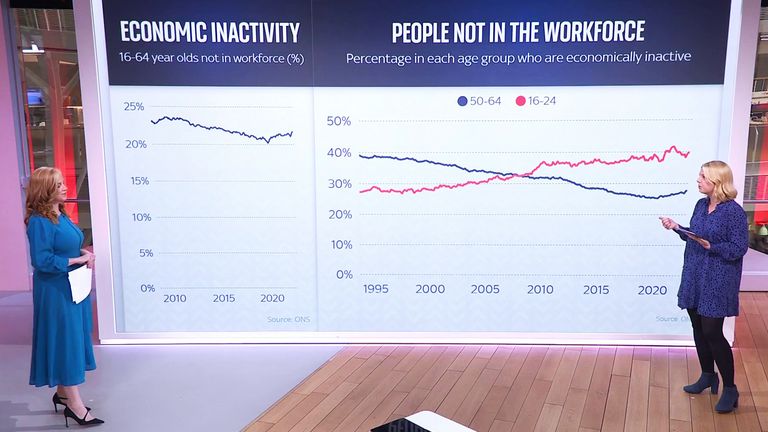Focus on helping mothers, older workers and people with disabilities into the workforce, govt urged
The government has been urged to focus on supporting mothers, older workers and those with a disability into and in the workforce in an effort to reduce the increased number of people classed as economically inactive – neither working nor seeking work.
A report from the Resolution Foundation think tank has also advised the state to divert efforts from persuading people who retired during the pandemic to return to work.
The numbers of people classed as economically inactive by the Office for National Statistics rose following the COVID pandemic. Official figures showed a rise of 565,000 people in economic inactivity between 2019 and the end of 2022.
A record number of people did not have a job because of long-term illness, ONS data from October 2022 said. The majority of those were over 50.
But focusing on trying to lure those who took early retirement during the pandemic back into work is unlikely to be effective, the post-pandemic participation report said.
The report said the increased number of people leaving the labour market during the pandemic was disproportionately due to higher-than-normal retirements among higher-paid professionals.
These people will be hard to persuade to return to work – two-thirds own their own home and have low costs of living.
At the same time the number of people retiring from low-paying jobs fell.
The focus of encouraging people into the workforce should instead be to support mothers and disabled people to enter and stay in the labour market.
A key issue for the government to target is what the Resolution Foundation described as the maternal employment gap, where employment participation rates among low-income women aged 25 to 54 were just 50% in 2017 to 2019, compared with 94% among high-income women the same age.
Improved childcare support is also suggested but the universal proposal to extend the number of free childcare hours has been advised against.
A universal benefit would largely boost the incomes of already-working parents in middle-and-high income households, rather than boost employment among lower income households, the foundation said.
Employment can be increased among lower-paid households by developing incentives for second earners in universal credit and reforming childcare support.
The report highlighted how a growing proportion of the population lives with a disability or ill health.
Policy action ought to be taken to tackle the underlying causes of the growing ill health trend, including rising mental ill health, but also to do more to help those affected stay in employment.
One suggested support is to create a new so-called right to return so workers who need take some time off due to ill health remain connected to their employer and job.
Without further progress, the report authors warn the economic inactivity rate for 15 to 75-year-olds is set to rise from 29.5% to 30.8% by 2030, the highest rate since the turn of the century in 2001.
The Resolution Foundation is a think tank aiming to improve the standard of living of low and middle-income families.
For all the latest business News Click Here


